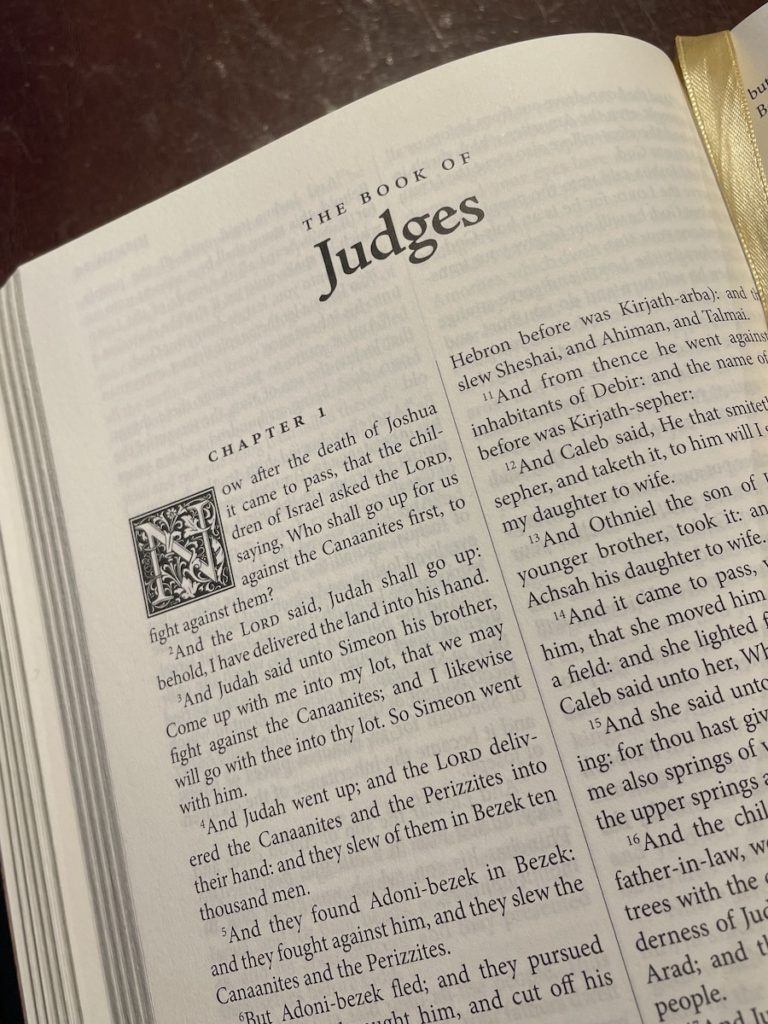
Judges 17

Judges 17:3, I had wholly dedicated. Micah’s mother made a foolish and unlawful vow to YHVH, as did Jephthah in chapter 11. Vows to YHVH are a serious thing and should be made in a righteous manner to righteous ends.
Judges 17:10, Be a father. For ten shekels, a suit of clothes, food and lodging, Michah hired an out of work Levite to be his own personal minister of his own manmade religion. Hireling ministers are a dime a dozen. Religious systems of men produce hirelings. This is a false spiritual paradigm that is self-sustaining and self-perpetuating.
Judges 17:13, Now I know. Michah cared nothing about serving YHVH and obeying his commandments. His only concern for religion was for self-gratification.
Judges 18
Judges 18:30–31, Manasseh…carved image. The son of Manasseh [Moshe/Moses]. The MT reads ﬣשׁמ/Moshe (Moses) with a hanging nun/נ inserted by the Jewish sages between the mem מ and the shin שׁ to make it read Manashe in an effort to hide the fact that the direct descendants of Moses became idol-worshippers. Jewish scholars readily admit this, and acknowledge the fact that the word Moshe is in the original (The Artscroll Rubin Edition Joshua-Judges Commentary, p. 223). Various versions of the LXX translate it either way. The Targums and the Syriac have Manasseh. (See Keil and Delitzsch, Adam Clarke and Bullinger in his Companion Bible for a more detailed discussion of this. The NIV, NRSV, RSV and ASV have Moses instead of Manasseh, while the NAS and NKJV have the latter, but add a footnote indicating that Moses as an alternate rendering.
Judges 19
Judges 19:24–25, Here is my virgin daughter…his concubine.This is nothing more than the degradation and abuse of women. This incident speaks volumes about the status of women in the ancient world. Even though the Torah uplifts and upholds the status of women, the neighboring pagan cultures, which the Israelites tended to follow, obviously did not. Islam and the Koran still follow these ancient practices viewing woman as property, chattel and second class citizens.
Judges 20
Judges 20:1–48, A lesson in warfare.Israel took a stand for righteousness against the sin of homosexuality. They did the right thing by inquiring of YHVH whether to go up against the Benjaminites who were harboring the sexually deviant brothers.
Twice YHVH told the Israelites to go up against Benjamin and that he would give them victory. Twice Israel was defeated losing thousands of soldiers. Each time afterwards, Israel did the right thing by humbling themselves, weeping and seeking YHVH’s counsel. The third time, Israel was victorious against Benjamin.
This begs an important question. Why wasn’t Israel victorious the first two times? Perhaps there was sin in the camp as was the case with Achan when the Israelites were defeated at Ai. The Israelites were right in punishing the unrepentant tribe of Benjamin, yet the rest of Israel wasn’t without sin either. After all, the Levite who had a concubine (a type of sex slave) in the first place, and then gave her to the mob of bisexual deviants to abuse and murder was also a guilty party. Not only that, the rest of Israel had failed to hold the Levite accountable for his sin.
What was the Levite’s sin? First, he should not have had a concubine sex slave. Second, he should have protected her from the mob. Obviously such practices were common among the Israelites—even among the Levitical leaders who YHVH had commissioned to be the guardians and teachers of the Torah—YHVH’s standard of righteous and set-apart living.
If the leaders of nation are morally and spiritually compromised, what is to become of the rest of the nation? Moreover, how is YHVH to bless such a nation by delivering them from their enemies when they themselves are sin-laden?
When expecting YHVH’s help and deliverance from our enemies and before engaging our enemies, we must clean our own house spiritually by repenting of sin. If not, we shouldn’t expect victory, or at best, only a partial victory, which is also a partial defeat. When a nation is not serving and obeying YHVH completely, and as a result, there is sin in the nation’s camp, and everyone in that nation is doing what’s right in his own eyes, and there is no strong, righteous central leadership in that nation (Judg 21:25), the fate of that nation will be what Israel experienced in this story. YHVH will be with them, but only up to the level their obedience to him merits it. This is a result of the divine law of cause and effect—the law of reciprocity. One reaps physically and spiritually what one sow.
Judges 20:28, Phinehas the son of Eleazar.Either Phinehas was hundreds of years old, or this story is an anachronism, or out of chronological order. Adam Clarke in his commentary on this verse suggest that this event occurred shortly after the death of Joshua. If this is the case, then the book of Judges is not written in chronological order.


In the separating of Church and State, the State falls into Depravity and the Church into Apostasy.
Its the same with Holy/Love. Separate these Siamese Twins and they will decline into unholy lust.
Shalom, John